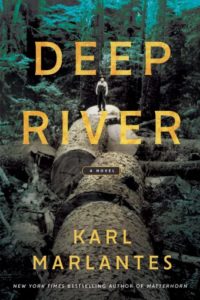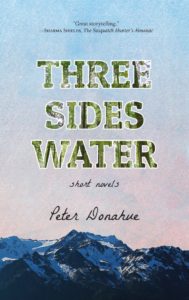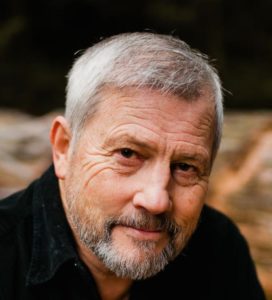Karl Marlantes: Deep River, a Novel
November 19, 2019 by David
Filed under Fiction, WritersCast
 Deep River – Karl Marlantes – 978-0-8021-2538-5 – Atlantic Monthly Press – Hardcover – 736 pages – $30 – July 2, 2019 – ebook version widely available at lower prices.
Deep River – Karl Marlantes – 978-0-8021-2538-5 – Atlantic Monthly Press – Hardcover – 736 pages – $30 – July 2, 2019 – ebook version widely available at lower prices.
“Deep River seems a work born from Willa Cather by way of Upton Sinclair. But this new book is its own animal, and it’s something of a masterpiece… In Deep River, [Aino] takes her place beside Antonia Shimerda as one of the great heroines of literature.”—BookPage (starred review)
Several years ago I discovered Karl Marlantes’ first novel, Matterhorn, which is a loosely autobiographical novel about the Vietnam War, in which Karl served as a Marine lieutenant. I think that is one of the best war novels I have ever read and was pleased to interview Karl about that book.
That book was followed by a nonfiction book called What it is Like to Go to War, which I also read and was affected by. What I said in 2011 still holds true: this book is a deeply thoughtful and moving work of nonfiction about the nature and meaning of war, and what it means to the individual warriors who participate who fight, as well as to the society that gives them that responsibility.
It took Marlantes almost thirty years to write and rewrite Matterhorn. Almost ten years after he completed that book, he has now turned in a completely different book, an historical novel set in the early 1900s, starting in Russian occupied Finland and moving to the Pacific Northwest. The three Koski siblings, Ilmari, Matti, and the politically radical young Aino, flee Russian oppression and come to the United States.
They join a community of other Finns in the logging area in southern Washington, during a time when massive trees of the old growth forest are being harvested by hard working men and dangerous technology. It is fertile ground for the establishment of radical labor movements like the IWW (Industrial Workers of the World, also known as the Wobblies). The two Koski brothers build their lives in this environment amid danger and many challenges, while Aino, just one of the book’s many also hard working independent women, works to build a union in an environment where organized labor is not welcomed by the logging industry or the power structures of the day.
Karl has built this novel following the structure and characters of the great stories of the Finnish oral tradition, written down in the nineteenth century as the Kalevala. It is a truly magisterial novel that weaves together so many strands of American and immigrant cultures, documents the struggles of the early twentieth century in the great forests of the Pacific Northwest, and shows us how human beings find a way to make meaningful lives despite the harshest challenges. Nothing comes easy for the Koskis their friends and families, but everything about them is redemptive and strong. It’s impossible to read this book and not be moved.
Reading Deep River is a commitment – it’s a long book – and there are inevitably times when it becomes difficult to keep track of the whole story and the many compelling characters in the book. That is not a criticism. The book is gripping, and well worth the time and attention of the reader. And it is impossible not to read it in the context of our current political circumstance. Reading about the sacrifices made by workers in the early twentieth century, to make advances for labor that are now taken for granted, and imagining their struggles as evidenced by the characters in this book, who are so thoroughly human in their differences and outlooks, personalities and beliefs, brings forth a range of thoughts about what has become of America today. We live in a world that others made great sacrifices for, and have somehow managed to avoid making sacrifices of our own. The people of Deep River as imagined by Karl Marlantes, deserve better from us.
I had the great pleasure to interview Karl in New Haven in a building on the Yale campus, where he was visiting during his book tour.
Karl Marlantes graduated from Yale University and was a Rhodes Scholar at Oxford University, before serving as a Marine in Vietnam, where he was awarded the Navy Cross, the Bronze Star, two Navy Commendation Medals for valor, two Purple Hearts, and ten air medals. He is the author of the novel, Matterhorn and a work of nonfiction, What It Is Like to Go to War. He lives now in Washington State.
Buy Deep River from RJ Julia here.
Podcast: Play in new window | Download
Peter Donahue: Three Sides Water (Short Novels)
June 19, 2018 by David
Filed under Fiction, WritersCast
 Three Sides Water – short novels – Peter Donahue – Ooligan Press – paperback – 978-1-932010-98-5 – $17 – ebook versions available at lower prices – May 1, 2018
Three Sides Water – short novels – Peter Donahue – Ooligan Press – paperback – 978-1-932010-98-5 – $17 – ebook versions available at lower prices – May 1, 2018
Ooligan Press is an unusual publishing operation; it’s a Portland, Oregon based independent publisher that draws its books from the rich literary communities of the Pacific Northwest. Founded in 2001, Ooligan is also a teaching press dedicated to the art and craft of publishing. Affiliated with Portland State University, the press is staffed by students pursuing master’s degrees in an apprenticeship program under the guidance of a core faculty of publishing professionals. This gives the press a continual sense of transformation and rebirth as the people involved with it change so frequently. I’ve made a number of literary discoveries through Ooligan’s diverse and very literate offerings.
I am really pleased that Ooligan decided to send me Peter Donahue’s unusual collection called Three Sides Water. The book is a collection of three short novels that I was immediately drawn to. And once I started reading the first novel, I was completely hooked. Donahue has been writing about the Olympic peninsula of Washington for some time. While he no longer lives there, clearly the area west and north of Seattle has captivated his imagination. Three Sides Water follows the construct of a peninsula itself – three stories surrounded by the space beyond. Each of the book’s short novels is about young characters, all in very different time periods, learning what it means to take responsibility for their own lives, and all of them must make decisions that will have long lasting consequences for themselves and others in their lives.
In his writing, Donahue literally inhabits the landscape of the far northwestern edge of our country with these stories. There’s a certain exoticism he brings us, with a careful eye and precise descriptive language that never gets in the way of the stories he is telling. His characters are all very different but share a common desire to become “something” – whether it is more, or better, or simply the desire to become an authentic self. The Pacific Northwest’s Olympic Peninsula is a itself a dramatic element, within which his compelling characters do what they must to establish the arcs of their lives, all in different ways and with different means, but all operating from the deepest part of their selves. The stories share common traits but are set in completely different time periods and tell very different tales, making this collection great fun to read.
Peter Donahue has published two full length novels, Clara and Merritt and Madison House (winner of the Langum Prize for American Historical Fiction), as well as a collection of short stories, The Cornelius Arms. He is the co-editor of two literary anthologies, Reading Seattle and Reading Portland, and of Seven Years on the Pacific Slope, a 1914 memoir set in Washington’s Methow Valley. Since 2005, he has written the Retrospective Review column on Northwest literature for Columbia: The Magazine of Northwest History, published by the Washington State Historical Society. Donahue teaches at Wenatchee Valley College in Omak, a small rural campus in North-Central Washington. More about Peter Donahue and his work can be found at his website here. And learn about the interesting Ooligan Press at its website here.
Peter Donahue is a fine story teller and an excellent interviewee as well. Thanks to him and to Ooligan for this excellent book.
Podcast: Play in new window | Download

